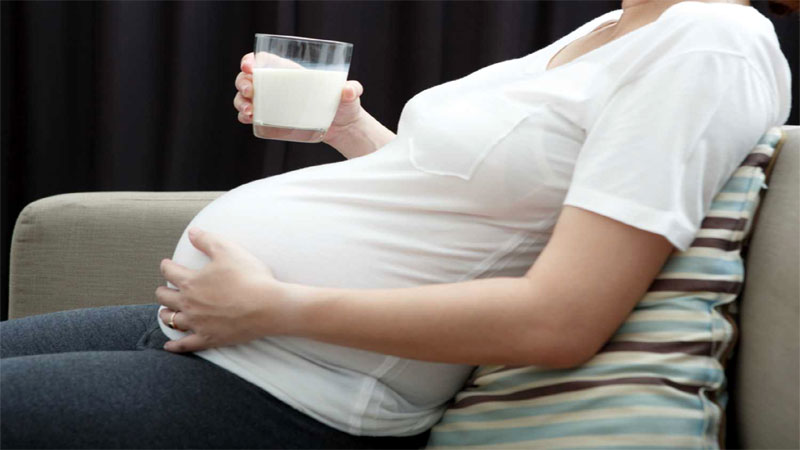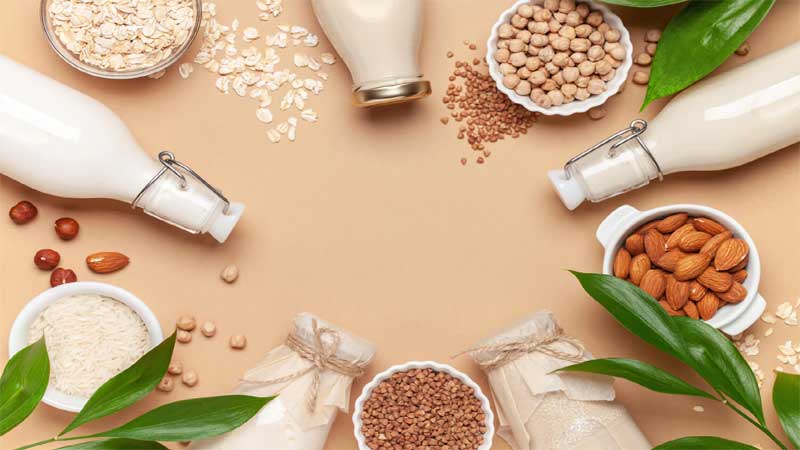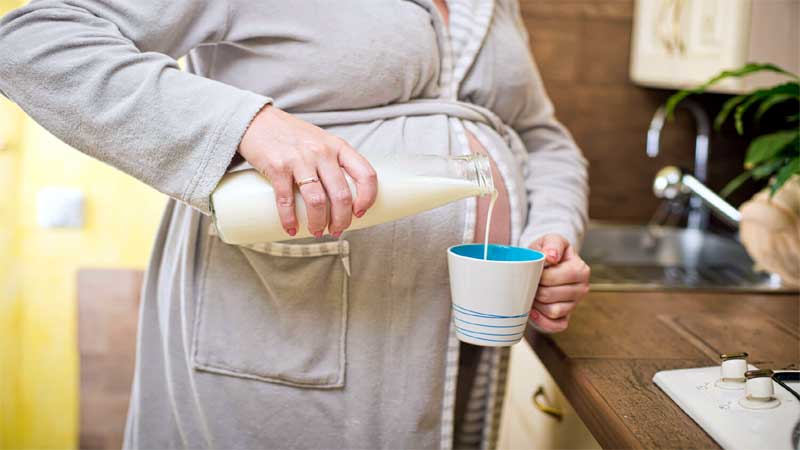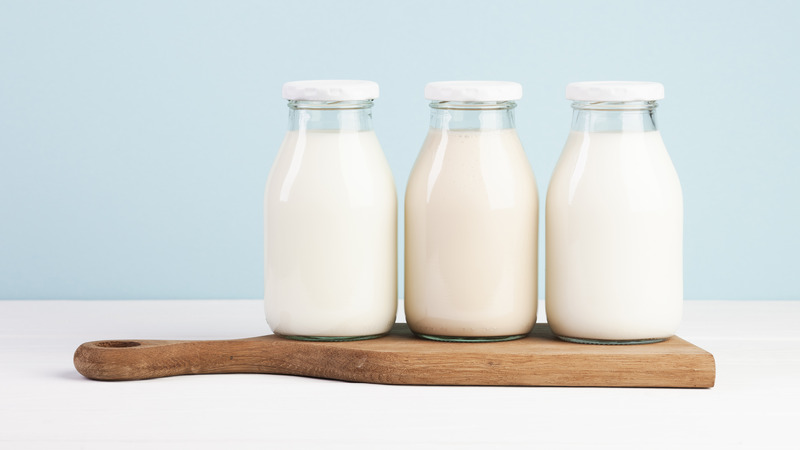
In a woman’s life, pregnancy is the most crucial and sensitive period. During this time, she is responsible not only for herself but also for the new life that is growing inside her. Optimal nutrition is of utmost priority, and drinking milk during pregnancy ensures that you meet many of your nutritional requirements. A pregnant woman needs an abundance of nutrients during pregnancy, which milk provides.
Whether or not to include milk and dairy products in a pregnancy diet is a matter of mixed opinion. A diet high in milk may cause iron deficiency. Milk can be extremely beneficial for your pregnancy if you take it correctly. It provides a variety of nutrients that your baby will require to develop properly. This article discusses the benefits of drinking milk during pregnancy and other aspects, such as how much milk to drink and tips and precautions to follow.
Can I Have Milk When Pregnant?
A lot of new moms ask this question, and the answer is “it depends.” There are fat-free, low-fat, and full-fat varieties of milk. Both pasteurized and unpasteurized versions are available. To enjoy the benefits of drinking milk during pregnancy, you must make the right choices. Furthermore, consuming too much dairy has been linked to several health issues, such as iron deficiency (1).
Whole milk from cows is a great way to get the protein and other nutrients you and your growing baby need, such as calcium, vitamin D, and vitamin B. During pregnancy, it’s generally acceptable to have a small amount of milk every day.
When to Start Drinking Milk During Pregnancy?

There are no specific guidelines on when to start drinking milk during pregnancy. In fact, the sooner you start, the better if you have not been drinking milk so far.
Milk is a treasure trove of various vital nutrients. Since pregnant women start feeling hungrier and peckish as the pregnancy progresses, milk can replace a small meal and meet the nutrient requirements of a pregnant woman.
You can always talk to your gynecologist or a nutritionist/dietitian about how much milk you can have to suit your health background and nutrient requirements.
Best Options For Milk During Pregnancy

The following are the best options for including milk in your pregnancy diet:
1. Cow’s Milk
Cow milk has important health benefits, such as boosting immunity and preventing diabetes. It contains Vitamin D, Vitamin E, and Vitamin A which help boost vision and provide proper nourishment.
2. Buffalo Milk
Buffalo milk is a rich source of minerals such as sodium, potassium, magnesium, calcium and phosphorous. It also also an excellent sources of calories and fats that can provide the much-needed energy for pregnant women.
However, the high fat and calorie levels can make it difficult to digest. So, when planning to consume buffalo milk during pregnancy, you can opt for low-fat buffalo milk which will still have the necessary mineral content with lowered fat percentages.
If you have any underlying health issues, you may consult your gynecologist on whether consuming buffalo milk during pregnancy will be safe for you.
3. Goat’s Milk
It helps with digestion, reduces inflammation, and aids in the weight loss process. It has a higher protein and vitamin content and helps maintain a healthy immune system. In comparison to cow milk, goat milk exhibited a variety of nutritionally beneficial properties, including lower quantities of specific SFA (15).
4. Milk Powder
Powdered milk may not be as nourishing as whole milk. But milk powders for pregnant women are available. These are formulated and fortified to provide the vitamins, minerals, proteins, and other elements necessary for a developing baby.
The different drying processes used in the production of powdered milk might impact the product’s final composition. For instance, if the milk is heated to a high enough temperature to make milk powder, the volatile heat components in it will be eliminated.
5. Soy Milk
Even though milk is a necessary source of calcium and protein during pregnancy, some women are lactose-intolerant and must avoid dairy products.
Soymilk during pregnancy is an excellent source of proteins, essential amino acids, vitamins and minerals. The protein content of soy milk is equal to that of cow’s milk (16), making soy milk a great choice for your pregnancy diet.
Proteins in soy milk support fetal development. This milk is also rich in minerals such as selenium, potassium, and magnesium.
Soy milk is an excellent alternative for women with lactose intolerance providing protein and other nutrient requirements.
It is also a perfect alternative for those who follow a vegan diet because it has all the benefits of milk and is low in fat. It is cholesterol-free and also supplies calcium to the mother and the fetus.
6. Saffron Milk
Saffron aids in relaxing the muscles of the body and helps in preventing indigestion. It provides relief from flatulence and bloating, helps improve appetite, and improves digestion.
During pregnancy, drinking a glass of saffron milk is said to have miraculous effects. It helps curb the mood swings in mothers-to-be.
It is believed that drinking saffron milk or kesar milk during pregnancy can make the baby fair but this turns out to be just a myth. For more details, read about the myth of kesar milk making babies fair.
7. Almond Milk
Almond milk is prepared by crushing the almonds finely and mixing it with water. Almonds are popularly known as badam.
Badam milk or almond milk is an excellent alternative for women with lactose intolerance and is rich in antioxidants and calcium. Among the many benefits of almond milk during pregnancy is its role in supporting the growth of the placenta.
[Read : Almond Milk During Pregnancy]
8. Oat Milk
Oats are a high-fiber food, this milk will contain a high amount of energy. Pregnant women feel tired quickly. Oat milk aids pregnant women by improving energy levels.
Oat milk is a great plant-based milk choice for women who are pregnant. It’s low in calories, full of important nutrients, and good for people who have to watch what they eat. As a result of its high fiber content, oat milk helps your body digest food and avoid constipation, which is common during pregnancy.
9. Rice Milk
Rice milk is a type of plant milk that is produced using rice. Those who are allergic to nuts, dairy, or soybeans may find rice milk to be a suitable substitute.
Rice milk is devoid of lactose, cholesterol, and calcium. While it is higher in carbohydrates and lower in protein compared to cow’s milk, certain varieties have added vitamins A and D. You can also easily prepare it at home.
10. Turmeric Milk
Pregnancy is a period during which a new mother needs to take extra care. Her immune system may be low too because most of her energy and nutrients go to nurturing her growing baby.
Drinking turmeric milk during pregnancy can provide immune support, help fight infections, improve blood circulation and relieve constipation. These benefits highlight why turmeric milk is recommended during pregnancy.
[Read: Saffron (Kesar) During Pregnancy]
Benefits of Drinking Milk During Pregnancy

According to experts drinking at least three glasses of either non-fat or normal milk every day contributes to meeting the daily nutrient requirement naturally. Here are the important benefits of drinking milk during pregnancy:
1. Excellent Source of Calcium
A pregnant woman needs at least 1200 mg of calcium every day (6). If not from the mother’s diet, the developing fetus will obtain enough calcium from the body’s abundant calcium stores found in the bones.
The future osteoporosis risk for the mother may be raised as a result of this. One cup of milk contains 300 mg of calcium (7). Daily consumption of milk helps meet these calcium requirements.
[Read: Calcium During Pregnancy]
2. Rich in Protein
A baby’s brain and other tissues and organs need protein to develop normally. Additionally, it supports the growth of breast and uterine cells while you are pregnant.
This vital nutrient ensures a steady blood supply. One cup of milk will provide you with approximately 8.14g of protein (8).
3. Rich in Vitamin D
Vitamin D is vital to ensuring a normal birth weight and preventing neonatal rickets (9). You can get most of your nutrients and other vitamins from various food sources.
But when it comes to vitamin D, milk is one of the very few sources rich in this vitamin (10). As a result, milk becomes an important component of your pregnancy diet.
4. Helps to Combat Heartburn
Did you know that milk is a natural antacid (11)?! Heartburn is a common occurrence during pregnancy, thanks to all the hormones that are playing havoc with your system.
Unfortunately, it is not advisable to take over-the-counter medications when you are pregnant. Milk becomes an excellent way to combat heartburn and other gastric ailments.
5. Healthy Way to Stay Hydrated
Keeping yourself hydrated is extremely important because the baby is also drawing fluids from your body. Milk will help you keep the hydration level of the body up.
6. Higher Level of Insulin
Milk proteins have been shown to improve postprandial insulin response while decreasing postprandial blood glucose response in both healthy participants and T2DM patients (12).
So drinking milk is advantageous for women experiencing gestational diabetes.
7. Enhances the Fetal Brain Development
Milk has a significant quantity of iodine (13). Did you know that for IQ development in children, iodine is a key component (14)? Also, being rich in proteins, amino acids, and fatty acids, milk helps with the development of the baby’s nervous system.
[Read: Importance of Iodine During Pregnancy]
Can We Drink Amul Milk Without Boiling?
Milks such as cow milk and buffalo milk must be boiled before consumption. Although these milks undergo a pasteurization process, changes in the weather can lead to the growth of bacteria that can lead to digestion-related issues and infections.
Pregnancy is a period to take extra care of yourself and your growing baby. So it is always a safe practice to drink cow milk only after boiling and cooling to the desired temperature.
What Are the Different Types of Milk?

Milk is available in many different varieties and forms depending on the source, processing, and fat levels. Some of the most common forms we regularly consume are:
1. Pasteurized Milk
Pasteurization is the process of partial sterilization where milk is treated with extreme hot and cold temperatures in quick succession. Pasteurized milk is free of all types of bacteria, especially heat-resistant bacteria such as E. coli, and is safe to consume.
In one study, E. Coli, coliforms, and Staphylococcus aureus were found in 42 (42%), 36 (36%), and 22 (22%) of a sample of raw milk. The numbers for the samples of pasteurized milk were 9, 2, and 2, respectively (2). This makes pasteurized milk safe during pregnancy. Pasteurized milk is also free from molds and yeast, making it extremely safe during pregnancy
2. Skimmed Milk
Skim milk, or low-fat milk, is milk with a fat content of less than 0.1% (3). To make low-fat milk, the cream that naturally occurs in whole milk is skimmed out first. This is the favorite among the health-conscious and fitness freaks because of the extremely low-fat content of the milk.
It delivers the benefits of milk but with no extra fat. The homogenization process removes most of the fat content from the milk.
3. Whole Milk
One notable characteristic of whole milk is its high saturated fat content (around 3.25% milk fat) (4). This milk skips the homogenization process and is a powerhouse of nutrients and health benefits. It is packed with enzymes necessary to carry out several bodily functions and is very much needed during pregnancy.
4. Raw Milk
This one is the complete opposite of the pasteurized one. Milk that has not been homogenized or pasteurized is known as raw milk. It is milk that is freshly derived from the farm. It could be tainted with dangerous bacteria. Raw milk and its products, such as yogurt, ice cream, and soft cheese, may contain bacteria that can lead to life-threatening illnesses (5).
Which Milk is Best and Which Milk to Avoid While Pregnant?
It is said that the healthiest milk to consume while pregnant is cow’s milk. Its nutritional profile is excellent, and it includes a variety of vitamins and minerals, including calcium, protein, and vitamin D, which are essential for a healthy pregnancy and the growth of the fetus.
Buffalo milk has a lot of fat; thus, it’s also advised against drinking it when pregnant. Consuming excess amounts of fat is not advised during pregnancy. Buffalo milk is also more dense and difficult to digest. Any food item that is hard to digest is not recommended during pregnancy.
Do’s and Dont’s While Drinking Milk During Pregnancy

Here are some guidelines and means to incorporate milk into your pregnancy diet:
- Avoid dairy products made from unpasteurized milk.
- Avoid drinking milk right after a meal.
- Once in a while, you can give it a twist by diluting milk with water (two portions of milk to one portion of water) and preparing fruit shakes and smoothies by adding fruits.
- Always drink warm milk.
- Never gulp it fast; instead, enjoy small sips.
Can Drinking Too Much Milk During Pregnancy Cause Harm?
Drinking too much milk is not a good option as it can cause bloating and indigestion. Drinking too much milk during pregnancy may lead to an iron deficiency in your child (17). Iron is essential for healthy brain development. Always remember that moderation is the key.
Effects of Not Drinking Milk During Pregnancy

If a pregnant woman never drinks milk during pregnancy, there is an increased chance of giving birth to an underweight baby. The mother may also be at risk of developing osteoporosis in the future.
Milk is a rich source of calcium for both the mother and the fetus. Not having enough calcium in a pregnant woman’s diet may cause the developing baby to absorb this nutrient from the mother’s calcium reservoir. This process will affect the mother’s bone mass.
In addition, the development of the child can be severely affected if the mother never drinks milk during pregnancy. Babies will be more at risk of neonatal rickets, low birth weight, excessive dehydration, etc.
Lactose-Free Milk During Pregnancy
Pregnancy means extra nutrition. The would-be mom will need a good intake of essential nutrients, minerals and vitamins. These include calcium and protein which are abundantly available in milk.
But if you have lactose intolerance during pregnancy, getting these nutrients may be challenging. Thankfully, there are some lactose-free alternatives to cow and buffalo milk.
Here are some lactose-free milk options for you during pregnancy.
- Almond milk
- Soy milk
- Oat milk
- Rice milk
- Cashew milk
When in doubt, you can always consult your gynecologist to make sure that these alternatives are safe for your during your pregnancy.
Drinking Milk in Pregnancy Increases the Possibility of Taller Children – Fact or Myth?
According to a recent study published in the European Journal of Clinical Nutrition, pregnant women who consume at least 150 ml of milk daily have a reduced risk of developing type 2 diabetes and have children who are taller (18).
Therefore, you must ensure that milk forms a key component of your pregnancy diet for healthy children. Along with milk, do follow a properly balanced diet for your overall health and wellness.
Milk is an excellent source of various nutrients for pregnant women. Whether you prefer to have milk from animal sources or plant-based milk, each variety has its nutritional strengths. When opting for plant-based milks, do ensure to pick the fortified ones as they will have the added nutrition you and your growing baby need.
FAQ’s
1. Can Drinking Milk During Pregnancy Cause Lactose Issues in Baby?
No, it will not; lactose problems can be hereditary.
2. What Type of Milk Should I Avoid When Pregnant?
Do not drink unpasteurized milk when pregnant. It can contain bacteria that can be dangerous. Also, boil milk well before consumption.
3. Can Drinking a Lot of Milk During Pregnancy Lead to Kidney Stones?
Drinking a lot of milk is known to cause kidney stones in many people.
4. Should I Drink a Lot of Milk During Pregnancy?
Drinking milk when pregnant can help both you and the baby. Milk is rich in many essential nutrients. However, a “lot” is not required.
5. Is It Okay Not to Drink Milk While Pregnant?
Do not consume milk if you have a personal aversion to it. However, you should make sure that your calcium intake is not affected and include milk products or replacements for milk, like almond milk.
6. Can Pregnant Women Drink Milk During Night?
Yes. In fact, drinking a glass of warm milk right before bedtime improves the quality of your sleep. Insomnia is common during pregnancy, and milk is one of the top solutions. However, never drink milk immediately after your meal.
7. How Much Milk to Drink During Pregnancy?
Pregnant women must have at least three cups of milk in a day, irrespective of their weight, physical activities, and stage of pregnancy. This is enough to provide all of its benefits. Never exceed this limit.
References
- The Consequence of Excessive Consumption of Cow’s Milk: Protein-Losing Enteropathy with Anasarca in the Course of Iron Deficiency Anemia—Case Reports and a Literature Review – [https://www.ncbi.nlm.nih.gov/pmc/articles/PMC8000842/]
- Bacteriological study of raw and unexpired pasteurized cow’s milk collected at the dairy farms and supermarkets in Sari city in 2011 – [https://www.ncbi.nlm.nih.gov/pmc/articles/PMC4718392/]
- Type of milk typically consumed, and stated preference, but not health consciousness affect revealed preferences for fat in milk – [https://www.ncbi.nlm.nih.gov/pmc/articles/PMC4702257/]
- Milk, whole, 3.25% milkfat, with added vitamin D – [https://shorturl.at/bchD4]
- Raw Milk Questions and Answers – [https://www.cdc.gov/foodsafety/rawmilk/raw-milk-questions-and-answers.html]
- Calcium intake from diet and supplement use during early pregnancy: the Expect study I – [https://shorturl.at/qrwZ9]
- Calcium Content of Foods – [https://www.ucsfhealth.org/education/calcium-content-of-foods]
- Milk, whole, 3.25% milkfat, with added vitamin D – [https://fdc.nal.usda.gov/fdc-app.html#/food-details/746782/nutrients]
- The role of vitamin D in pregnancy and lactation: emerging concepts – [https://www.ncbi.nlm.nih.gov/pmc/articles/PMC4365424/]
- Dietary Intake of Vitamin D from Dairy Products Reduces the Risk of Osteoporosis – [https://www.ncbi.nlm.nih.gov/pmc/articles/PMC7353177/]
- Antacid properties of milk and milk products in comparison to other foods and commonly available antacid pharmacological preparations – [https://shorturl.at/ektER]
- Milk in the prevention and management of type 2 diabetes: The potential role of milk proteins – [https://pubmed.ncbi.nlm.nih.gov/31111646/]
- Iodine Content of Milk and Other Foods – [https://pubmed.ncbi.nlm.nih.gov/30934447/]
- The effects of iodine on intelligence in children: a meta-analysis of studies conducted in China – [https://apjcn.nhri.org.tw/server/apjcn/14/1/32.pdf]
- The nutritive value of soya milk and cow’s milk in malnourished children: A comparative study – [https://www.sciencedirect.com/science/article/abs/pii/S002234766680063X]
- Comparative Nutrient Profiling of Retail Goat and Cow Milk – [https://www.ncbi.nlm.nih.gov/pmc/articles/PMC6835441/]
- Milk Anemia: Iron Deficiency Due To Milk Consumption – [https://healthmatch.io/anemia/milk-anemia]
- Drinking milk during pregnancy linked to adult height, lower risk of type-two diabetes – [https://shorturl.at/fiIY4]

